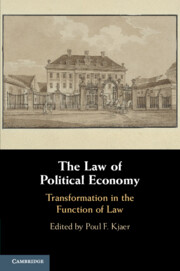Book contents
- The Law of Political Economy
- The Law of Political Economy
- Copyright page
- Dedication
- Contents
- Contributors
- Acknowledgements
- Abbreviations
- 1 The Law of Political Economy
- Part I Studying the Law of Political Economy
- 2 The Legal Proprium of the Economic Constitution
- 3 The Myth of Democratic Governance
- 4 A Political Economy of Contemporary Legality
- Part II Transformations of the Law of the Globalising Economy
- Part III The Transformation of the Law of Political Economy in Europe
- Part IV Towards a New Law of Political Economy
- Index
2 - The Legal Proprium of the Economic Constitution
from Part I - Studying the Law of Political Economy
Published online by Cambridge University Press: 18 April 2020
- The Law of Political Economy
- The Law of Political Economy
- Copyright page
- Dedication
- Contents
- Contributors
- Acknowledgements
- Abbreviations
- 1 The Law of Political Economy
- Part I Studying the Law of Political Economy
- 2 The Legal Proprium of the Economic Constitution
- 3 The Myth of Democratic Governance
- 4 A Political Economy of Contemporary Legality
- Part II Transformations of the Law of the Globalising Economy
- Part III The Transformation of the Law of Political Economy in Europe
- Part IV Towards a New Law of Political Economy
- Index
Summary
Our narrative is rooted in historical analysis but is of vital contemporary relevance. Ernst-Joachim Mestmäcker and Rudolf Wiethölter are celebrated protagonists of the post-war German academic generation and, as such, are each obsessed with the “proprium” of law. Conceptually-rooted in the ordoliberal tradition of Franz Böhm and Walter Eucken, on the one hand, and in the living constitutionalism of Hermann Heller, on the other, Mestmäcker and Wiethölter have consequently trod very different paths in their treatment of economy and society within the legal-constitutional perspective. We are clearly partisan in our allegiance, yet, in recalling the efforts of Mestmäcker to defend the legal co-ordination of the economy within a pre-political “order freedom” (Eucken), and the contrasting endeavour of Wiethölter to picture the political administration of the economy, as well as the “law-(justification)-making” of its societal law, we are reminded of the naïvety of utopian notions of market constitution, but also of the corresponding difficulties (paradoxes) of political socialisation processes that are mediated by the law. In a contemporary context of European financial and sovereign debt crisis, we find that one of the primary victims of naïvety and complexity is the proprium of law itself, which seems to have run out in the subsuming of economic theory within European law, and which can surely only be re-established with great difficulty through the, as yet to be established, relationship between a societal European law and the emerging grassroots politics of progressive European peoples.
Keywords
- Type
- Chapter
- Information
- The Law of Political EconomyTransformation in the Function of Law, pp. 33 - 61Publisher: Cambridge University PressPrint publication year: 2020

